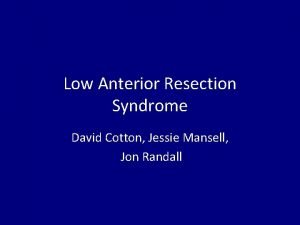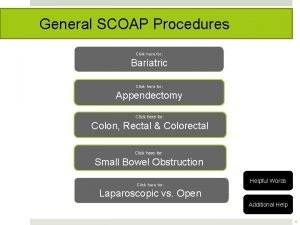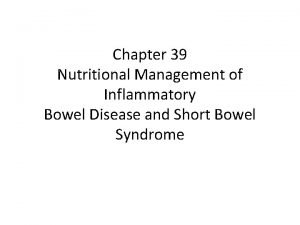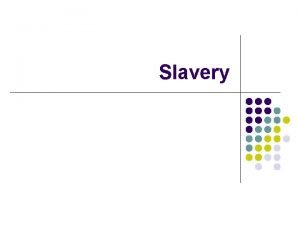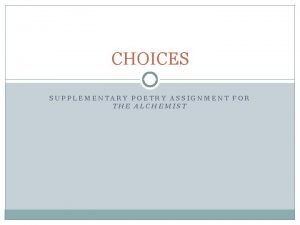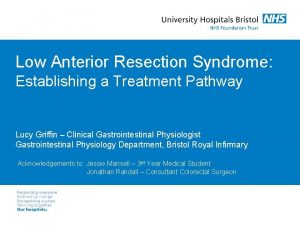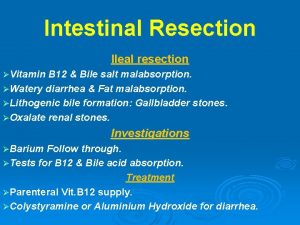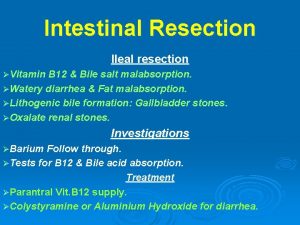Low Anterior Resection Syndrome David Cotton Jessie Mansell












- Slides: 12

Low Anterior Resection Syndrome David Cotton, Jessie Mansell, Jon Randall

Low Anterior Resection • Curative treatment for low rectal cancer • Avoiding permanent stoma + wound complications of APER • Sphincter preservation as an aim has led to very low tumours being resected • Total Mesorectal Excision • Anastomotic leak + pelvic complications • Neoadjuvant chemoradiotherapy (+ adjuvant treatment for many) • Clinical concentration often on disease/survival

Low Anterior Resection Syndrome (LARS) • “Disordered bowel function after rectal resection leading to a detriment in quality of life” 1 • In reality this varies and has been said to include urgency, loose stool, frequency, altered stool consistency, obstructed defecation and incontinence • If present at one year after surgery (or stoma closure) then it is likely to be present after 10 years 2

Reproduced from Chen et al 3

The LARS score • Developed by Emmertsen + Laurberg 4 in Denmark • Subsequently validated in English by Juul et al 5 • Quality of life after rectal cancer surgery is dependent on a number of factors • However it is closely linked to LARS – ‘Major’ LARS causes a significant reduction in quality of life compared to no LARS 6

Likely risk factors 1, 3, 7 Neoadjuvant chemoradiotherapy Short/no remnant rectum (<5 cm) Clinical anastomotic leak/abscess/defect Prolonged presence of defunctioning ileostomy • Nerve dysfunction (pudendal neuropathy) • Older age • Preoperative dysfunction • •

Differential diagnoses • • Radiation enteritis Chemotherapy-induced enteritis Malabsorption Anastomotic stricture Disease recurrence Primary (pre-operative) dysfunction Other causes of altered bowel habit

Medical (‘traditional’) management • • • Dietary advice Loperamide Bulking agents Amitriptyline Buscopan

Advanced management • • Stool training + advanced education Counselling Biofeedback Rectal irrigation

Sacral Nerve Stimulation • Still an evolving technique for LARS • 2015 review article in Colorectal Disease 8 found 43 patients considered for SNS for LARS • In this instance for incontinence + LARS – Median follow-up 15 months – 34 implants placed – 94. 1% improvement in symptoms (74. 4% on intention to treat) • PTNS may also have similar efficacy 9

References 1. 2. 3. 4. 5. 6. 7. Bryant CL, Lunniss PJ, Knowles CH, Thaha MA, Chan CL. Anterior resection syndrome. Lancet Oncol. (2012); 13(9): e 403 -8. Sturiale A. , Martellucci J. , Valeri A. Long term functional results after laparoscopic low anterior resection for rectal cancer. Colorectal Disease (2015), Poster Abstracts. 17: 38– 101. doi: 10. 1111/codi. 13053 Chen T, Wiltink L, Nout R et al. Bowel Function 14 Years After Preoperative Short. Course Radiotherapy and Total Mesorectal Excision for Rectal Cancer: Report of a Multicenter Randomized Trial. Clin Colorect Cancer (2015); 14(2): 106 -114. Emmertsen KJ, Laurberg S. Low anterior resection syndrome score: development and validation of a symptom-based scoring system for bowel dysfunction after low anterior resection for rectal cancer. Ann Surg (2012); 255(5): 922 -8. Juul T, Battersby N, Christensen P et al. Validation of the English translation of the low anterior resection syndrome score. Colorectal Dis (2015); 17(10): 908 -16 Juul T, Ahlberg M, Biondo S et al. Low anterior resection syndrome and quality of life: an international multicenter study. Dis Col Rectum (2014); 57(5): 585 -91. Ziy Y, Zbar A, Bar-Shavit Y, Igov I. Low anterior resection syndrome (LARS): cause and effect and reconstructive considerations. Tech Coloproctol (2013 ); 17(2): 15162.

References 8. 9. Ramage L, Qiu S, Kontovounisios C et al. A systematic review of sacral nerve stimulation for low anterior resection syndrome. Colorectal Dis. (2015); 17(9): 762 -71. Troncoso P, Vigorita V, Garrido L et al. Preliminary results in the use of posterior tibial nerve stimulation in the treatment of Low Anterior Resection Syndrome. Colorectal Dis. (2015); 17(S 2): 44.
 Mansell syndrome
Mansell syndrome Leica total station setup and operation
Leica total station setup and operation Brisbane 2000 classification
Brisbane 2000 classification Abdominal perineal resection
Abdominal perineal resection Neplasia
Neplasia Ileum resection
Ileum resection Cotton on the roadside cotton in the ditch
Cotton on the roadside cotton in the ditch Egyptian vs pima cotton
Egyptian vs pima cotton Richard mansell exeter
Richard mansell exeter Stephanie mansell
Stephanie mansell Hard choices jojoba mansell
Hard choices jojoba mansell Que imagem é essa
Que imagem é essa Mid = low + (high - low) / 2
Mid = low + (high - low) / 2
